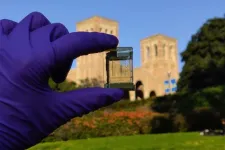(Press-News.org) NORMAN, OKLA. – University of Oklahoma engineering researcher Sangpil Yoon, Ph.D., has been awarded a $2.3 million grant from the U.S. Department of Health and Human Services, National Institutes of Health, for his project titled “Development of protein-based nanostructures activated by ultrasound.”
The five-year grant is part of the NIH’s Research Project Grant (R01) program, which supports cutting-edge health-related research and development initiatives. Yoon’s funding, totaling $363,919 for the first year, helps move his research into protein-based delivery systems that could revolutionize how diseases are treated at the cellular level forward over the next five years.
Yoon says his research in cell engineering signals a significant advancement in both laboratory and clinical settings. “Our work is fueled by the utilization of artificially engineered gas vesicles (GVs) and the fusion of RNP enzymes and other proteins, offering promising avenues for medical advancement and the promotion of holistic well-being,” Yoon said.
The project focuses on tackling one of the major challenges in advancing cell-based and patient-specific therapies: gene cargo delivery systems. Yoon’s goal is to pioneer a novel in vitro non-viral intracellular delivery approach by combining GVs – protein shells containing gas in the core – with Cas9-ribonucleoprotein, the RNP enzyme, to form protein clouds as delivery cargo. The delivery system will be controlled by ultrasound excitation, enabling safe and efficient manipulation of target cells.
Yoon explains that while viral methods are common and effective, they have limitations regarding what they can deliver and the size of the molecules they can transport. “The uniqueness of our GV and ultrasound-based method lies in its non-viral nature, which potentially overcomes some of the limitations,” Yoon said.
Traditional gene therapy methods often rely on viral vectors for delivery, which come with limitations such as payload size restrictions and potential immune responses. Yoon’s approach offers several advantages, though. Unlike viral methods, the GV and ultrasound-based approach is non-viral, allowing for the delivery of various types of molecules, including proteins and nanoparticles, without size limitations. Additionally, the use of ultrasound enables precise spatial-temporal activation of the delivery system, enhancing its safety and effectiveness.
Important to Yoon’s research is the utilization of GVs as contrast agents for ultrasound imaging. These naturally occurring structures, derived from bacteria, offer several advantages over existing delivery systems. Notably, their smaller size compared to microbubbles allows for more efficient delivery through connective tissues and blood vessels. Furthermore, GVs can serve dual purposes as both delivery vehicles and imaging agents, streamlining the diagnostic and therapeutic process.
His research also holds promise for addressing the cost-effectiveness of gene therapy methods. By eliminating the need for complex cell manipulation procedures and logistical challenges associated with current therapies, his approach has the potential to significantly reduce the overall cost of treatment.
###
About the Project:
The project, titled “Development of protein-based nanostructures activated by ultrasound,” began Feb. 1, 2024, with funding expected through Jan. 31, 2029. The project is funded by the National Institute of General Medical Sciences, National Institutes of Health, Project #1R01GM152704-01.
About the University of Oklahoma:
Founded in 1890, the University of Oklahoma is a public research university in Norman, Oklahoma. As the state’s flagship university, OU serves the educational, cultural, economic and health care needs of the state, region and nation. OU was named the state’s highest-ranking university in U.S. News & World Report’s most recent Best Colleges list. For more information, visit www.ou.edu.
END
NIH awards $2.3 million grant to University of Oklahoma for gene therapy research
2024-04-15
ELSE PRESS RELEASES FROM THIS DATE:
Hidden threat: Global underground infrastructure vulnerable to sea-level rise
2024-04-15
As sea levels rise, coastal groundwater is lifted closer to the ground surface while also becoming saltier and more corrosive. A recent study by earth scientists at the University of Hawai‘i (UH) at Mānoa compiled research from experts worldwide showing that in cities where there are complex networks of buried and partially buried infrastructure, interaction with this shallower and saltier groundwater exacerbates corrosion and failure of critical systems such as sewer lines, roadways, and building foundations.
“While it has been recognized that shallowing groundwater will eventually result in chronic flooding as it surfaces, ...
Study reveals AI enhances physician-patient communication
2024-04-15
As one of the first health systems in the country to pilot the use of generative artificial intelligence (GenAI) to draft replies to patient messages inside the Epic Systems electronic health record, UC San Diego Health is a pioneer in shaping the future of digital health.
The results of a new University of California San Diego School of Medicine study indicate that, although AI-generated replies did not reduce physician response time, they have contributed to relieving cognitive burden by starting an empathetic draft, which physicians can edit rather than starting from scratch.
The study, published in the April 15, 2024 online edition of the Journal of ...
Mitchell A. Lazar honored with prestigious George M. Kober Medal for pioneering contributions to diabetes and metabolic research
2024-04-15
PHILADELPHIA— Mitchell A. Lazar, M.D., Ph.D., the Rhoda and Willard Ware Professor in Diabetes and Metabolic Disease, and Director of the Institute for Diabetes, Obesity, and Metabolism in the Perelman School of Medicine at the University of Pennsylvania, is the 2025 recipient of the George M. Kober Medal from the Association of American Physicians (AAP). Lazar will receive the honor in Chicago at the AAP’s annual meeting which takes place April 25-27, 2025.
The AAP, an elected society of the nation’s most distinguished physician scientists, was founded in 1885 by seven physicians, including Sir William ...
SMU prof to use NSF grant to develop game-based semiconductor curriculum for high school students
2024-04-15
DALLAS (SMU) – The challenge is to connect the dots for high school students between the technology in their cell phones and the career options manufacturing the devices. To that end, the National Science Foundation (NSF) has awarded an Innovative Technology Experiences for Students and Teachers (ITEST) grant to SMU professor Lin Lipsmeyer and colleagues toward developing one of the first game-based semiconductor curricula for high school students.
The online game-based semiconductor curriculum will be made available to a wide range of students through a collaboration with Dallas-based gaming company Stimuli. Additional ...
Advance in light-based computing shows capabilities for future smart cameras
2024-04-15
Researchers developing the next generation of computing technology aim to bring some light to the field — literally.
Optical computing, which relies on particles of light called photons, is expected to provide alternatives to traditional electronic approaches. Such systems — or light-based components of hybrid systems that also retain electronic parts — could be faster, consume less energy and compute visual information more efficiently through simultaneous, parallel processing.
To date, ...
Q&A: How claims of anti-Christian bias can serve as racial dog whistles
2024-04-15
In a speech to a group of religious broadcasters in February, Donald Trump promised to create a task force to counter “anti-Christian bias,” which he said would investigate the “discrimination, harassment and persecution against Christians in America.”
It’s not the first time Trump has claimed that Christians are being persecuted, and he’s not alone. As more politicians repeat these statements, researchers from the University of Washington investigated whether anti-Christian bias claims can also be ...
Three advances in pavement technology — for safer, more sustainable roadways
2024-04-15
While April showers bring May flowers, these months also kick off road construction season — when cracks and potholes that developed over the winter get fixed. But recent advances could make future roadways safer and repairs more sustainable, thanks to smart pothole monitoring, snail shells and graphene. The new approaches can be found in three papers recently published in ACS journals. Reporters can request free access to these papers by emailing newsroom@acs.org.
A smart pothole monitoring system for cars. By harnessing the vibrations that shake a vehicle as it drives over uneven pavement, researchers have created a system that ...
Civil engineer looks to remedy inequities in traffic safety
2024-04-15
Alyssa Ryan, an assistant professor of civil and architectural engineering and mechanics, in the University of Arizona College of Engineering, is leading a national study to identify disparities in traffic safety for all transportation users, including drivers, bicyclists and walkers.
"Transportation engineering is very focused on people and impacting society and how people interact with the world," said Ryan. "If you don't have transportation, you can't do anything."
With a $467,000 ...
New research highlights effects of gentrification on urban wildlife populations across U.S. cities
2024-04-15
Chicago (April 15, 2024) – New research published on Monday, April 15 in the Proceedings of the National Academy of Sciences of the United States of America (PNAS) identifies how gentrified parts of a city have notably more urban wildlife than ungentrified parts of the same city, further limiting marginalized communities’ opportunity to connect with nature. The study, led by Lincoln Park Zoo’s Urban Wildlife Institute, analyzed data from 23 cities across the continental U.S., collected by partners of the Urban Wildlife Information Network ...
Vaccine breakthrough means no more chasing strains
2024-04-15
Scientists at UC Riverside have demonstrated a new, RNA-based vaccine strategy that is effective against any strain of a virus and can be used safely even by babies or the immunocompromised.
Every year, researchers try to predict the four influenza strains that are most likely to be prevalent during the upcoming flu season. And every year, people line up to get their updated vaccine, hoping the researchers formulated the shot correctly.
The same is true of COVID vaccines, which have been reformulated to target sub-variants of the most prevalent strains ...





